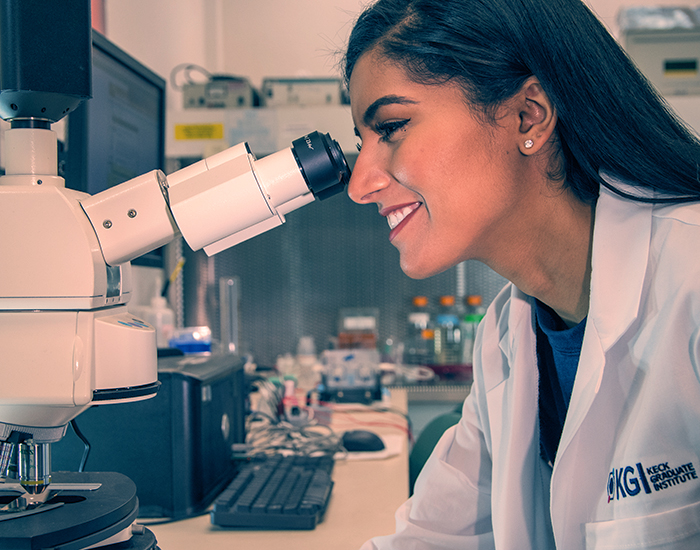Abrar Al Maghribi, MS ’18, simply needed some research experience when she asked to work in the lab with Rachita Sumbria, an assistant professor of biopharmaceutical sciences at Keck Graduate Institute (KGI). A student in KGI’s Postbaccalaureate Premedical Certificate (PPC) program at the time, Al Maghribi never imagined she would become the coauthor of an article in Molecular Pharmaceutics, a highly regarded scientific journal in the field of pharmaceutics and drug delivery.
The results of the research, an investigation of a potential treatment for Alzheimer’s disease by Sumbria’s lab and collaborators at the University of California, Irvine, and Armagen, Inc., appeared in the journal’s October 2018 issue. Titled “Brain Penetrating Bifunctional Erythropoietin–Transferrin Receptor Antibody Fusion Protein for Alzheimer’s Disease,” the article describes how the study using mice confirmed that brain-penetrating EPO—shorthand for Erythropoietin–has a positive effect on the brain.
Al Maghribi received second-author credit for her contributions to the research. She had been responsible for sectioning and staining brain tissue, then examining the tissue to determine whether EPO had reduced plaques and inflammation that cause toxicity to the brain and damage to neurons.
“Abrar really helped us connect the dots. She also did a lot of data analysis and established protocols. Her hard work earned her a well-deserved co-authorship on the research article,” says Sumbria.
All of the work was new to Al Maghribi when she began. Sumbria trained her in the necessary research techniques.
“She was in the lab every day and made sure I was good at what I needed to do before I did it. I learned so much! And I appreciated her patience and support,” says Al Maghribi, who decided to continue working with Sumbria to complete her master’s thesis.
Sumbria believes a positive attitude and strong work ethic contributed greatly to Al Maghribi’s success, explaining, “She made the research her priority and put in a lot of extra hours. She was very conscientious and asked a lot of questions. I realized I could trust the data she generated: It was quality data. The publication is validation of the techniques she learned and reflects well on her commitment to research.”
Al Maghribi has since moved on to KGI’s doctoral program in applied life sciences and subsequently plans to go to medical school. Her PhD research involves working with Arnold and Mabel Beckman Professor Angelika Niemz on the commercialization of an affordable medical diagnostics technology that can be used in a doctor’s office or health clinic to test for sexually transmitted diseases. Al Maghribi teaches current master’s students in the lab to perform their work well, applying what she learned through the research experience that enabled her to become a published author.
“I realize that some students need extra help,” she says. “I learned to work with others patiently and to be open-minded because I started at zero as well.”
